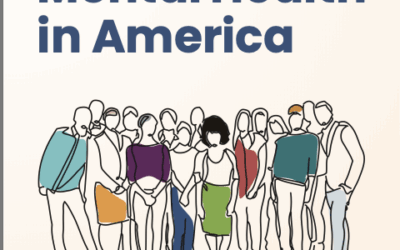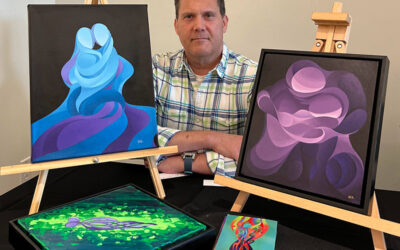As colleges and universities across the country (and K-12 schools, too!) begin gauging the decision to continue in-person or remotely, I wanted to take time through this blog to explore the mental health implications of virtual education. Is it beneficial? Is it harmful? What considerations do we need to make for students with different learning styles, students with disabilities, high-risk students?
Many students around the world got a taste of roughly ½ a semester of learning from home. In addition to the several challenges COVID-19 has presented for this population (e.g., returning to unsafe home environments, international students unable to return home, people with mental health conditions and substance use disorders, and more), many are unsure what the upcoming fall and spring semesters are going to be.
A survey in June from Core Spaces, a housing company, revealed significant findings from a sample of 2,500 college students in terms of mental health, including:
- Nearly 90% of respondents said they want to come back to campus when classes begin this fall.
- More than three out of five (63.3%) respondents said the pandemic resulted in economic difficulties for themselves and their families.
- Nearly 60% of respondents said online classes had been a negative experience for them.
- Nearly 8 out of 10 said they feel they’d be more successful studying remotely in their school apartments or dorms vs. their family’s homes.
- 76% of respondents reported that their sleep pattern has changed.
- 75% of respondents reported that they feel more anxious or stressed.
- 55.5% of respondents reported that they feel more depressed or worried.
- Only 12% of respondents reported they had seen a professional for physical or mental health
Albeit this survey represented a small sample of college students in the U.S., it pulled data from 12 cities and 11 states, using representative sampling measures to ensure validity.
With that data from Core Spaces along with other studies being conducted, it’s clear that online learning has presented unprecedented challenges for many students. The COVID-19 pandemic in the U.S. is still a rising issue, and there is a chance that colleges that announced fall reopening might have to readjust those plans. For many students without the same resources colleges offer them—WiFi, computers, webcams, or textbooks—it’s very possible not all people can viably and financially transition to this form of education.
With that being said, educational psychologists around the country are researching ways to enhance online learning and prioritize learners’ and educators’ mental health. The American Council on Education has compiled this report for faculty in higher education to prioritize the needs of their students, even if that’s from a distance or virtually via Zoom. I want to share some of the key findings from Active Minds that disclose students’ most urgent needs for educators and school leaders to address during remote periods of learning. In this survey of 2,086 college students, these were the responses:
- Increased academic support: leniency, accommodations, and flexibility
- More mental health resources: increased investment in counseling and coping resources
- Focus on soft skills: empathy, compassion, communication, understanding, and validation for the burdens students are experiencing
- More opportunities for social connection: replace canceled events, services, and classes with virtual ones
- Engage in long-term planning: colleges need to be prepared to help students heal and recover when they return and put in place improved practices and protocols to more easily pivot to remote learning in case of another similar crisis
With these key findings, I hope that my own university and others around the U.S. will focus on the needs of their very own students.
As state economies begin to open and cases increase again, the unpredictability of the pandemic can certainly cause intense stress and uncertainty. With all of these factors considered, I have created a list of services, support groups, funding, and information below for college-aged folks and for educators and school leaders. Please feel free to share these resources to help protect people’s mental health and if you are an educator or university leader, remember to prioritize your mental health as well, as these can be immensely stressful times for all parties involved.
Direct Mental Health Services:
Mental Health America of Virginia COVID-19 Warm Line: free, confidential, & available M-F 9:00am-9:00pm Sat-Sun 5:00pm-9:00pm
- For Virginia constituents:
- The Mental Health America of Virginia Warm Line is available through call or text at 877-349-6428 for COVID-19 virtual support
National Suicide Prevention Lifeline: 24/7, confidential, and free
- Call 1-800-273-8255 for distress, prevention and crisis resources for you or your loved ones, and best practices for professionals or online chat here
SAMHSA Disaster Distress Helpline: 24/7, confidential, and free
- Call 1-800-985-5990 or text TalkWithUs to 66746 to access the national hotline dedicated to providing immediate crisis counseling for people who are experiencing emotional distress related to any natural or human-caused disaster.
Virginia Department of Health Hotline: free, confidential
- Call 877-ASK-VDH3 (877-275-8343) to get COVID-19 questions answered by a professional at the Virginia Department of Health
National Runaway Safeline: 24/7, confidential, and free
- Call 1-800-786-2929, text 66008, or access free online chat here to assist runaway, homeless, and at-risk youth with crisis intervention and safety planning services
Mental Health America:
- Free online screening tools for mental health conditions here
- General resource list for COVID-19 and mental health here
- For Virginia constituents:
- The Mental Health America of Virginia Warm Line is available at 1-866-400-MHAV (6428) for mental health resources and referrals in Virginia
Therepeasy:
- Help get matched to an online mental health provider here
- Totally free, accessible, and instant matching with a therapist
American Psychological Association Help Center:
- List of national and statewide hotlines for support here
- Search tool to find a psychologist near you for longer-term help here
Crisis Text Line: 24/7, confidential, and free
- Free texting service that can be accessed by texting HOME to 741741 for free, 24/7 crisis counseling
HelpGuide:
- A guide to mental health and wellness, with COVID-19 resources available here
Trans Lifeline Peer Support Hotline: 24/7, confidential, and free
- Call 877-565-8860 to speak with an operator who identifies as trans or gender non-conforming/questioning
- More information on the Trans Lifeline and its services are available here
Black Emotional and Mental Health (BEAM) Collective:
- Dedicated to the healing, wellness, and liberation of Black and marginalized communities, with a Black Virtual Therapist Directory tool here
Men To Heal:
- An initiative that encourages men to pay more attention to their overall wellness, mental and physical health, to communicate effectively and increase their knowledge of self, especially African American men who face additional stigma
- The founder, James Harris, hosts quarterly sessions within the local community in Virginia or virtually in other states through The Healing Hub
National Asian American Pacific Islander Mental Health Association (NAAPIMHA):
- This resource provides mental health and behavioral services for Asian Americans, Native Hawaiians, and Pacific Islanders here
- COVID-19 resources for Asian Americans are available here
Asian American Suicide Prevention & Education: 24/7, confidential, and free
- If you or someone you know is concerned about the risk for suicide, call the Asian LifeNet Hotline at 1-877-990-8585 (available in Cantonese, Mandarin, Japanese, Korean, and Fujianese)
The Trevor Project: 24/7, confidential, and free
- A national organization providing crisis intervention and suicide prevention services to (LGBTQ) young people ages 13-24.
- Call 1-866-488-7386 to access the TrevorLifeline suicide prevention and crisis intervention phone service or online chat here
- Text START to 678-678 to access confidential, 24/7 TrevorText with a counselor
LGBT National Hotline: free and confidential, M-F 4:00 pm-midnight & Saturday noon-5 pm (EST)
- Call 888-843-4564 or email help@LGBThotline.org to talk and receive resources for different issues and concerns including, but not limited to, coming out issues, gender and/or sexuality identities, relationship concerns, bullying, workplace issues, HIV/AIDS anxiety, safer sex information, suicide, and much more
- For LGBTQ folks under the age of 25, access the LGBT National Youth Talkline by calling 800-246-7743 or by emailing help@LGBThotline.org
Boys Town National Hotline: 24/7, free
- Call 1-800-448-3000 or text VOICE to 20121 to access a crisis and resource line staffed by counselors to provide information about a variety of issues, including chemical dependency or access the website here
National Drug Helpline: 24/7, confidential, and free
- Call 1-844-289-0879 to get private, confidential help from trusted professionals day and night to help get on the road to recovery
- More information on the Helpline and information about specific drugs can be found at the website here
Addiction Recovery Support Warm Line: 24/7, confidential, and free
- Call 1-833-4PEERVA (1-833-473-3782) specifically for those struggling with addiction in the Richmond area, their loved ones, and others to talk with trained individuals who have lived experience in addiction recovery, specializing in recovery from opioids and other substances
National Eating Disorders Association (NEDA) Helpline: free, confidential; M-R 11am-9pm EST & F 11am-5pm EST
- Call 1-800-931-2237 for support, resources, and treatment options for yourself or a loved one or access live online chat here
National Association of Anorexia Nervosa and Associated Disorders Helpline: free, confidential; 9am-5pm CST
- Call 630-577-1330 to access the ANAD Eating Disorders Helpline
Half of Us:
- Text START to 741-741 or call (800) 273-TALK (8255) to get support for your emotional health, including body image issues and eating disorders
- More resources can be found here
The Jed Foundation: 24/7, confidential, and free
- Text START to 741-741 or call 1-800-273-TALK (8255) for emotional health and suicide prevention support
Additional Resources for Remote Learners:
- Active Minds COVID-19 Mental Health Resource Page, with numerous videos and tools to take care of your mental health during these times
- National Alliance on Mental Illness (NAMI) COVID-19 Resource and Information Guide, updated June 2020
- “How I’m Coping with COVID-19 and Physical Distancing as a Person in Long-Term Recovery”, article by Holly Jespersen
- “Anxious About the Coronavirus? Here Are Eight Practical Tips on How to Stay Calm and Support Your Immune System”, article by Sheila Patel, M.D., Chief Medical Officer from the Chopra Center
- “Tips on depression management in lockdown: Coping with COVID-19”, from MedicalNewsToday
- “Signs of Depression During the Coronavirus Crisis”, by Caroline Miller from the Child Mind Institute
- Therapy for Black Girls, notes from Dr. Joy’s “Racism and Mental Health” Podcast
- “Self-Care Tips For Asian Americans Dealing With Racism Amid Coronavirus”, by Brittany Wong in the Huffington Post
- TrevorSpace, an online international peer-to-peer community for LGBTQ young people and their friends
- Trans Teens Online Talk Group, a weekly moderated group for trans and gender-expansive youth ages 12 to 19, to talk in a safe space and to be able to fully express themselves 7-10 pm EST on Thursdays and Fridays
- Q Chat Space, an online community for LGBTQ+ teens to find and give support, have fun, connect around shared interests and get good information
- COVID-19 Mutual Aid Fund for LGBTQI+ BIPOC Folks, GoFundMe Page to donate to in support of queer communities of color struggling due to COVID-19
- “Staying Safe During COVID-19”, article and resources from the National Domestic Violence Hotline
- Q&A: Violence against women during COVID-19, from the World Health Organization
- Online Wellness Recovery Action Plan (WRAP) Group for Black Community Members, 8-week recovery group hosted by VOCAL Virginia
- Structuring Your Day To Support Self-Care in Eating Disorder Recovery, from Eating Disorder Hope
- “Considerations for the Care and Treatment of Mental and Substance Use Disorders in the COVID-19”, SAMHSA Report (March 2020)
Useful Articles, Links, and Resources for Educators & Faculty:
- “Serving Students Who Can’t—or Won’t—Return to School”, by Denisa R. Superville in Education Week
- Supporting Students and Families COVID-19, from the Minnesota Department of Education
- “Considerations for the Care and Treatment of Mental and Substance Use Disorders in the COVID-19”, SAMHSA Report (March 2020)
- Finding Mental Health Help For Someone Else, from Mental Health America National
- “I Am Young, Immunocompromised, and COVID-19 Positive”, by Jamie Horrigan on HealthLine
- “How to Support Employees with High-Risk Concerns During a COVID-19 Outbreak”, by Carolyn Crist on SHRM.org
Anna Marston, Intern
Mental Health America of Virginia



